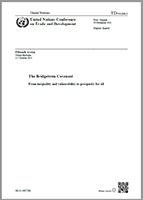
Nearly six decades ago, the international community came together in Geneva in the firm conviction that trade could make a difference to the world and do more to connect nations and peoples and enhance their economic opportunities. In a spirit of solidarity and cooperation, the world came together to ensure that progress achieved became prosperity shared.
The phrase “prosperity for all” captured the ideals and objectives of the first session of the United Nations Conference on Trade and Development (UNCTAD), and its realization became the raison d’être of UNCTAD and, subsequently, its creed.
The serious challenges to multilateralism are being exacerbated. Strengthened multilateralism and coordinated international action are crucial for effectively addressing these challenges and improving prosperity for all. Inequality, within and between countries, exacerbated by vulnerability, has become one of the most challenging issues facing policymakers at the national and international levels.
Now, the Conference meets again, for the fifteenth time, in the most unprecedented of circumstances. In addition to climate change threats, we are experiencing a coronavirus disease (COVID-19) pandemic which has generated a global health and economic crisis, exacerbating fiscal as well as other challenges faced by developing countries. In this scenario, and faced with declining resources, it is paramount that member State engagement with UNCTAD be strengthened.
Since the outbreak of the COVID-19 pandemic, nearly 5 million people have lost their lives. Global gross domestic product (GDP) contracted severely in 2020. Millions of people have already lost their jobs, and millions more have had their livelihoods compromised.
Most disturbingly, more than 150 million people are expected to join the ranks of extreme poverty by the end of 2021, depending on the severity of the economic contraction. These grim figures and facts reflect the profound human suffering and immense challenges ahead.
The end of the pandemic may be in sight with the arrival of a vaccine, but the scale and scope of the crisis and its consequences are likely to be long-lasting and have yet to be fully appreciated.
UNCTAD should contribute to the implementation of and follow-up to the outcomes of relevant global conferences, including the 2030 Agenda for Sustainable Development, the Addis Ababa Action Agenda and, as appropriate, the Paris Agreement under the United Nations Framework Convention on Climate Change, among other relevant international agreements and outcomes.
While enhancing its work in support of addressing the trade and development challenges of all developing countries across all regions, UNCTAD should:
- Strengthen its special focus on the trade and development needs of the least developed countries across all areas of its mandate, in accordance with the Programme of Action for the Least Developed Countries for the Decade 2011–2020 (Istanbul Programme of Action) and any relevant successor agreement reached at the Fifth United Nations Conference on the Least Developed Countries.
- Continue to support Africa in addressing its special concerns and needs, including as articulated in the New Partnership for Africa’s Development, and in the implementation of the African Continental Free Trade Area.
- Further address the special trade, investment and development needs of landlocked developing countries, including through continuation of its support for effective implementation of the Vienna Programme of Action for Landlocked Developing Countries for the Decade 2014–2024 (Vienna Programme of Action).
- Continue its work in assisting small island developing States to address persistent trade, investment and development challenges that they encounter, including through the implementation of the SIDS Accelerated Modalities of Action (SAMOA) Pathway.
- Continue to give focus to the special needs and problems of structurally weak and vulnerable small economies in order to foster sustained economic growth and sustainable and inclusive development.
- Continue to support the development efforts of middle-income countries, according to their needs, in facing specific challenges of sustainable economic development and poverty eradication.


